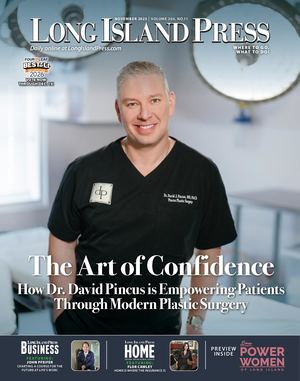Another census means more congressional seats lost
New York is losing some of its influence, and that can mean trouble for Long Islanders.
In 1950, when Harry S. Truman was president, New York had 45 congressional seats, the most in the nation. The recent past had seen the four terms of Hyde Park’s Franklin D. Roosevelt, with FDR’s distant cousin, Theodore, serving as president earlier in the century. Further back, the 19th century had seen several New Yorkers as president: Martin Van Buren, Millard Fillmore, Chester Arthur, and the popular Grover Cleveland.
From 1868 to 1948, a span of 80 years, a New Yorker was on the presidential ticket every election year, either as president or vice president, save for 1896 and 1924. That included the all-New York races of both 1904 and 1944, the former pitting Theodore Roosevelt against Alton B. Parker and the latter a contest between Franklin Roosevelt and then-Gov. Thomas E. Dewey. There was also the legendary 1876 race, where the Democrat nominee, Samuel J. Tilden of New York, won the popular vote, but lost the White House to the Republican Rutherford B. Hayes in the famous “deal” of 1877.
However, 1950 represented the zenith in the state’s Electoral College clout. Since that census, New York has lost a jaw-dropping 18 congressional seats, including two more from the 2010 tally. If present trends continue, New York, decades hence, may only have around the same number of Electoral College votes as not just Ohio, Pennsylvania, and Illinois, but also Virginia, North Carolina and Georgia.
Are such trends permanent? What would that mean for New York’s standing in national politics? Is the problem that other states are just growing at a faster rate? Are there reasons for the out-migration other than taxes? Anton Community Newspapers recently sought the opinion of several longtime political observers.
Disappointment With Ackerman Decision
William Burton, village attorney for the Village of Roslyn, acknowledged that fewer congressional districts has negative consequences.
“Loss of districts in a state due to redistricting means a loss of influence in Congress,” he said. “Leaders in the House need votes to pass legislation and the larger delegations can deliver votes and therefore become more influential. Larger delegations can also place more members on influential or what is referred to commonly as ‘A’ committees. With more members on committees, states can also get more funding for the state.”
Burton also lamented the loss of learned members of congress from New York, men who contributed to the national debate.
“When New York lost Representative Stephen Solarz because he did not want to run against another member, Ted Weiss, it lost a valuable position on the House Foreign Affairs Committee,” he added. “Then too, highly experienced Congressman Gary Ackerman announced his retirement at the same time as new lines for districting were being drawn. While the congressman may have made his decision based on other considerations, it may well have played some role in his ultimate decision not to run in the newly designed Flushing-based seat. The loss of Rep. Ackerman means the absence of one of the most knowledgeable and influential members of the New York delegation.”
Mike Miller, a columnist for Anton Community Newspapers, a resident of New Hyde Park, was also disappointed by Rep. Ackerman’s decision.
“A lot of political people in both parties are more than a little annoyed that Congressman Ackerman insisted that he was definitely running again right up to the point that the districts were finalized, and then announced he was retiring,” Miller said. “This information would have made the collapsing of two districts easier and more logical. A district was virtually drawn for Mr. Ackerman in Queens, wasting opportunities to maintain districts in other parts of the state, such as the Hudson and Delaware Valleys, where the 22nd district was cannibalized.”
Miller, however, believes the tide may be stemmed in coming decades, noting that California and other Sun Belt states might experience a slower population growth. Much of New York’s losses have been due, he added, to upstate communities as Long Island has experienced some growth in population.
Above all, Miller focused on the ever-growing size of congressional districts. In 1980, he said, the average New York district had 467,000 people. Now, it has ballooned to 717,000 people. The House of Representatives has been fixed in size at 435 members since 1929, in a law that Miller maintains does not reflect the intention of the Founders.
“It is incredibly expensive to run in a district that size, and it is incredibly difficult for citizens in the district to play a meaningful role in the legislative process,” he said. “With 700,000 people in a district, we are way past the point where effective representation is diminished. The sheer size of these districts breaks down connections between Long Island and Washington. This ceiling of 435 seats isn’t found in the Constitution and it has never been ratified or endorsed by any of the state legislatures. The system we use now, with a fixed number of representatives automatically apportioned based on the census, is not the system that has been in place for the most of this country’s history.”
As with Mike Miller, another Anton columnist, Mike Barry, also believes that the 435-seat limit is a reason for New York’s decades long hemorrhaging of congressional seats. Despite such losses, Barry believes the state will remain a major player in national politics. But he also maintains that taxes aren’t the only reason for out-migration.
“Many New Yorkers become former New Yorkers for reasons having little to do with the state’s tax burden,” he said. “Having said that, I imagine most people in this state periodically weigh the high cost of living here with their quality of life, and some within that group subsequently start looking to see whether better opportunities exist elsewhere.”
“I believe the real reason we are losing people is tied directly to stagnant wages as well as a three-season climate,” said Village of Massapequa Park Mayor James Altadonna, referring to sunnier destinations, bereft of heating bills. “Both put a large burden on people living in New York.”
The coming years will, of course, decide if Miller’s guarded optimism about negative trends being slowed down are true or if, a decade from now, one or two more New York congressmen will be made to fall on their swords and announce their retirement.

































